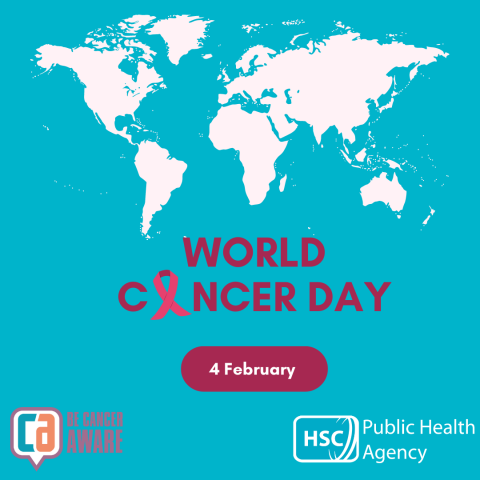Be aware of symptoms this World Cancer Day

As we approach World Cancer Day on Saturday 4 February, the Public Health Agency (PHA) is highlighting the signs and symptoms of cancer and encouraging people to seek medical advice from their GP if they have concerns.
Dr Louise Herron, Consultant in Public Health at the PHA, said that the earlier cancer is diagnosed, the greater the chances of survival as treatment is more likely to be successful.
“Changes to your body’s normal processes or unusual, unexplained symptoms can sometimes be an early sign of cancer,” Dr Herron said.
“It is important to be body aware and take action if you notice any unusual changes. Spotting cancer early could save your life.”
Dr Herron urged people not to let the fear of what the doctor might find, or feelings of embarrassment, stop them from having their concerns checked out.
“We are urging people to get checked early if they have any concerns. It is important for everyone to be aware of warning signs which need to be investigated. In many cases these symptoms will turn out to be a sign of something far less serious, but if it is cancer, an early diagnosis means treatment is more likely to be successful.”
Below are some things that could be symptoms of cancer. A fuller list of key signs and signs and symptoms of cancer is available online at www.cancerresearchuk.org/about-cancer/cancer-symptoms
- Persistent cough or shortness of breath.
- Unusual changes to the size, shape or feel of a breast, including nipple or skin changes.
- A change in bowel habits, such as constipation, looser poo or pooing more often.
- Unexplained bleeding in your pee or poo or unexplained vaginal bleeding, including after sex, between periods or after the menopause.
- An unusual lump or swelling anywhere on your body.
- A new mole or changes to a mole.
- Unexplained weight loss.
- An unexplained pain or ache.
The PHA’s website www.becancerawareni.info provides information about cancer signs and symptoms, explains what to do if you are concerned and signposts to recommended sources of support or further information.
There are many things that people can do to reduce the risk of cancer including:
- If you smoke, stop. Visit www.stopsmokingni.info for tips on helping you to quit and information on support services available.
- Keep alcohol consumption within safer limits. Advice on this can be found at www.drugsandalcoholni.info.
- Take regular exercise and aim to keep your weight within the recommended BMI range. Visit www.choosetolivebetter.com for more information on simple steps that can help maintain a healthy weight.
- Avoid over-exposure to ultraviolet radiation from either sunbeds or the sun – use sunscreen, seek shade, wear sun glasses and a hat. Check your skin regularly for any changes. See www.careinthesun.org for more information.
It is also important to make use of the range of cancer screening programmes that are available and to attend for screening when invited.
“We have three excellent cancer screening programmes in place to help detect the early signs of cancer,” Dr Herron said.
“These are for cervical, breast and bowel cancer, and they all play an important part of our efforts to catch cancer early.”
For more information on Northern Ireland screening programmes visit www.cancerscreening.hscni.net
